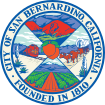San Bernardino International Airport
San Bernardino International Airport | |||||||||||
|---|---|---|---|---|---|---|---|---|---|---|---|
| File:SBD-Logo.jpg | |||||||||||
 | |||||||||||
| Summary | |||||||||||
| Airport type | Public | ||||||||||
| Owner | San Bernardino International Airport Authority (SBIA) | ||||||||||
| Operator | SBIA | ||||||||||
| Serves | San Bernardino / Inland Empire | ||||||||||
| Location | San Bernardino, California, USA | ||||||||||
| Elevation AMSL | 1,157 ft / 353.3 m | ||||||||||
| Coordinates | 34°05′43″N 117°14′06″W / 34.09528°N 117.23500°W | ||||||||||
| Website | San Bernardino International Airport | ||||||||||
 | |||||||||||
| Runways | |||||||||||
| |||||||||||

- For the United States Air Force use of this facility prior to March 1994, see Norton Air Force Base
San Bernardino International Airport (IATA: SBD, ICAO: KSBD, FAA LID: SBD) is a public airport located two miles (3 km) southeast of the central business district of San Bernardino, California, in San Bernardino County, California, USA. The airport covers 1,329 acres (538 ha) and has one runway. It is currently a general aviation and cargo airport located on the former site of Norton Air Force Base. A non-federal control tower (NFCT) began operation on November 9, 2008, operated under contract by SERCO company personal. The new tower freq. is 119.45. San Bernardino International Airport was an option for Allegiant Airlines while it was shopping for a new Southern California Airport, but instead chose Los Angeles International Airport because SBD was too far inland.
History
Norton Airforce Base
The airbase opened shortly after the attacks on Pearl Harbor to protect the Southern California area. Norton was placed on the Department of Defense's base closure list in 1989 (the same year that the DoD signed the Federal Facilities Agreement with the EPA).
The closure was cited as due to environmental wastes, inadequate facilities, and air traffic congestion (due to air traffic from Ontario International Airport, twenty miles (32 km) west, and Los Angeles International Airport, 100 miles (137 km) west). The last of the facilities on the base were closed in 1995.
Status
U.S. Customs Service agents are available on call to clear imported goods. The airport is used as a base for United States Forest Service planes fighting forest fires. Several hangars that were formerly empty have recently been occupied by civilian-owned aircraft maintenance companies. The runway is 10,000 feet (3,000 m) long, easily accommodating air cargo aircraft. However, UPS Airlines and FedEx Express choose to use LA/Ontario International Airport to the west, while DHL uses the March Air Reserve Base to the south.
The airport and surrounding areas are within the City of San Bernardino, and the Inland Valley Development Agency. The airport and surrounding areas are being redeveloped by Hillwood.
The airport temporarily housed SAM 27000 while the Air Force One Pavilion at the Ronald Reagan Presidential Library was under construction.
Several major projects for the former air base and surrounding area are imminent or already under way, including Stater Bros. Markets which moved its corporate headquarters from Colton to the former air base site in September 2007. The 170,000-square-foot (16,000 m2) offices are completed. Stater Bros. began moving warehousing and distribution operations into a 2,100,000-square-foot (200,000 m2) facility in February 2007. Part of a $300 million-plus total investment in the city, the warehouse is the largest supermarket distribution facility in the nation, Brown said.
Passenger Service, Renovations and Location
San Bernardino International Airport is currently undergoing a major renovation to prepare the airport for upcoming passenger service. The main terminal building was recently redone. An extra story was added and also a new baggage claim concourse as well. An all new international terminal is also under construction. New signs were added to guide people to the main terminal building and parking from as far away as the I-10/Tippecanoe interchange. The roads in the surrounding area have also been widened, repaved, or otherwise improved to handle an increase in traffic. San Bernardino has a long runway which will make it an alternate landing site for large aircraft. It is expected to be a particularly important alternate airport since there are many trans-Pacific flights headed to LAX and other nearby airports including Ontario and Palm Springs.
Location
The airport is located approximately 2 miles (3km) east of downtown San Bernardino, 22 miles (29 km) east of Ontario and 14 miles (23 km) northeast of downtown Riverside. Motorists can either use the San Bernardino Freeway (Interstate 10), Barstow-Downtown San Bernardino-Riverside Freeway (Interstate 215), or the Foothill Freeway (State Route 210) to access the airport. It is also served by Omnitrans. In combination with the Metrolink and Amtrak station in western San Bernardino, passengers will be able to access the airport via train and bus from all over SoCal.
Airlines and destinations
Southeastern Jet Corporation will begin a private charter service at the airport in the fall of 2009.[1]
| Airlines | Destinations |
|---|---|
| Southeastern Jet Corp | N/A |
Also See
References
- ^ Roberts, Charles (2009-08-04). "Jet Service comes to SBD". Highland News. ISSN 0458-3035. Retrieved 2009-08-04.
External links
- San Bernardino International Airport (official site)
- FAA Airport Form 5010 for SBD PDF
- FAA Airport Diagram (PDF), effective October 31, 2024
- Resources for this airport:
- FAA airport information for SBD
- AirNav airport information for KSBD
- ASN accident history for SBD
- FlightAware airport information and live flight tracker
- NOAA/NWS weather observations: current, past three days
- SkyVector aeronautical chart, Terminal Procedures

